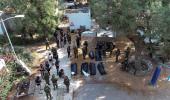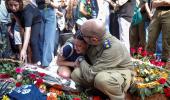'There is no safe spot in Gaza.'
'Israeli airstrikes are targeting everything, everywhere.'
'Hospitals, mosques, churches, schools have been bombed. These are places where people were taking shelter.'

Hanin Barghouti heads the Ramallah office of Gift of the Givers Foundation, the largest disaster response, non-governmental organisation of African origin in Africa. In Palestine, the Foundation also works out of Gaza, apart from Syria, Yemen, Lebanon and Turkey, in the Middle East -- focussing on countries of conflict.
International aid agencies provide food and life essentials to roughly 63 per cent of people in Gaza. Since October 7, aid to Gaza completely stopped, resuming with less than a trickle on October 21. Fuel supplies were totally restricted till November 15 and even then fuel was meant for UN trucks only.
Hanin, 29, has lived under Israeli occupation in the city of Ramallah in the West Bank for as many years.
In the concluding segment of a two-part interview with Rediff.com's Swarupa Dutt Hanin Barghouti talks about the catastrophic consequences of Israeli bombing for aid organisations.
- Part 1 of the Interview: 'Israelis are committing genocide'
Dr Ahmed Abbasi, the head of your organisation in Gaza, was killed in an Israeli rocket strike earlier this month.
Tell us what happened.
Dr Ahmed has been working with Gift of the Givers since 2013 and he dedicated his life in helping the needy, the displaced, orphans, and the elderly. Ahmed used to live in the northern part of Gaza, which is where the most intense bombing is taking place. He did not want to evacuate, but was forced to do so for the safety of his three kids, his wife and the rest of his family. So he evacuated to Gaza City, which is also facing heavy bombing.
He was at a morning prayer at a mosque with his brother, who is also a doctor. While they were leaving the mosque, he, his brother and 26 others, were killed in an Israeli air strike. He was taken to a hospital and then buried. His family did not get a chance to say farewell because moving out of your homes is not safe.
But this is what is happening with thousands of other Palestinians in Gaza. What is happening in Gaza is genocide.
Give us a background of your organisation. What work does your organisation do around the world? What work does it do in Gaza and the West Bank?
Gift of the Givers is one of the biggest emergency organisations in the African continent. It began in South Africa and now it works in most conflict countries around the world.
We give humanitarian aid to the poor, elderly, injured, disabled, and to refugees and the displaced. We provide emergency relief such as hot meals, food parcels, water, drinking water, medical aid wherever there is conflict or wars, like in Gaza and in the West Bank. Before this war we also had a free kidney transplant programme for the poor.
We operate in places that are in need. We began in Africa because of starvation deaths, and the high incidence of poverty. In the Middle East, apart from Palestine, we work in Syria, Yemen, Lebanon and Turkey.
We don't have any political affiliations.
Our office in Ramallah in the West Bank, where I work, covers Jerusalem as well. Our office in Gaza, has local partners, volunteers and staff in different regions in order for us to cover all bases. In Gaza, the main office is in Gaza City.

How do you deliver aid now with the severe fuel shortage in Gaza? When you talk of humanitarian corridors, we know now there is no safe place in Gaza.
What are your colleagues in Gaza saying?
All humanitarian organisations are facing difficulties in implementing their interventions because moving around is unsafe and also due to the lack of supplies. In the first few weeks of the war we were still able to provide all the needed interventions because we had access to hot meals, food supplies, clean water, medical supplies, but with the escalation it is difficult to source aid and deliver aid.
After fuel ran out, it became very hard to do what we do.
Our team has been carrying food parcels from the warehouses to volunteers who then deliver it to the needy. They walk all the way, because our vehicles have no fuel. It makes the process harder and longer but moving around in vehicles is also very dangerous now. Before Ahmed was killed, he did everything possible to deliver aid knowing full well it was dangerous to move around.
Israel has opened what they call safe corridors, but the aid trucks entering Gaza are still too few and people in Gaza are on the verge of starvation.
There is no safe spot in Gaza. Israeli airstrikes are targeting everything, everywhere. Hospitals, mosques, churches, schools have been bombed. These are places where people were taking shelter.
The Israelis are claiming that they are opening humanitarian corridors for the aid to be let in to Gaza, but there is no humanitarian corridor that is safe. The Israelis forced people in the north to evacuate to the south, and when they were fleeing south, they were bombed and killed.
Does Gift of the Givers deliver aid to orphanages as well?
There are no orphanages in Palestine. When children lose their parents they stay with relatives. So our aid is delivered to them through their families, to their houses.

Where does your funding come from?
We get the funding from the main office in South Africa; they do the fundraising, while we are an implementing office.
What do you lack the most in terms of humanitarian aid since the war began?
We lack everything. Life essentials -- food, water, electricity, medicines. There is little or no fuel so most hospitals are shut. Bakeries can't work, so people can't buy bread. If Israel allowed more fuel to enter Gaza, life essentials can be sourced and sent to people who need them.
It is really hard for me to communicate with my team in Gaza. I wake up every morning and ask them, 'Are you alive? Are you safe? Please just tell me are you alive'. It takes hours for them to reply because there is no Internet connectivity any more, and telecommunications are almost nil.
So, what do we need the most in Gaza? The answer is everything that allows people to simply live. There is nothing more or nothing less when we talk about life essentials.

There is no way for your colleagues to get out of Gaza?
No, my colleagues in Gaza are Palestinians, they are Gazans. They are not willing to leave their houses and leave the lands. And for what? They have families, they are married with kids. They can't just leave everything behind and leave Gaza. And even if they wanted to leave, where would they go?
Sixty per cent of the people of Gaza are refugees living in refugee camps. Their ancestors - fathers, grandfathers -- were displaced in the first Nakba in 1948. They were displaced from the places that are now called Israel and they moved to Gaza.
So they are not going to repeat what happened in the 1940s and be refugees all over again. As my colleague Dr Ahmed who died in the bombing told us, 'I prefer to die in dignity in my homeland, instead of evacuating and being a refugee in other countries where I do not have anything.' It breaks my heart to talk of him in the past tense.
But that's the sentiment -- we prefer to stay in our land and die there, instead of leaving our homelands for the Israelis to take over.

Do you coordinate with the UN or other relief agencies for the work that you do?
Before this war, yes, of course, we coordinated with the UNRWA, because we work with the refugees, with UNRWA schools, with sick people, to deliver aid. All international aid organisations in Gaza coordinate with each other in order to cover as many people as possible.
How much of your aid has dried up in percentage terms, approximately?
We are functioning at 10% of our actual capacity because we lack everything. We don't have access to anything. We have begun providing mattresses as well now for those whose homes have been destroyed.

How many colleagues do you have in Gaza now?
We have four employees in Gaza, but we have tens of volunteers, local partners, photographers, still working there.
What do these food packets you distribute consist of?
Before this war, we used to distribute canned foods, flour, rice, staples, whatever a family needs for a whole month. The cost of the parcel varies from $50 to $100 depending on the size of the family. Basically, we put everything that a family needs for a month in the parcel. A food parcel for say a family of eight people during Ramadan would cost $100.
You said the parcels are distributed to needy families, how do you decide who is needy?
At least 80 per cent of Gazans live below the poverty line, unemployment rates are over 45 per cent. So by these parameters alone, most people in Gaza are needy.
We coordinate with our teams on the ground and the Palestinian ministry of social affairs. Those who are poor are registered with this ministry and so we get a list from the ministry. We conduct field visits to the families on this list, we go to schools, coordinate with municipalities and the information so gathered ensures we reach families in need.
After this war ends, the battle to deliver aid begins.
Feature Presentation: Aslam Hunani/Rediff.com










